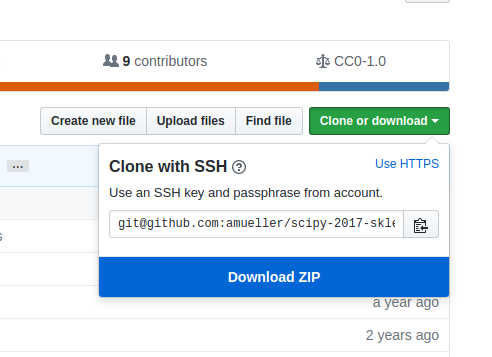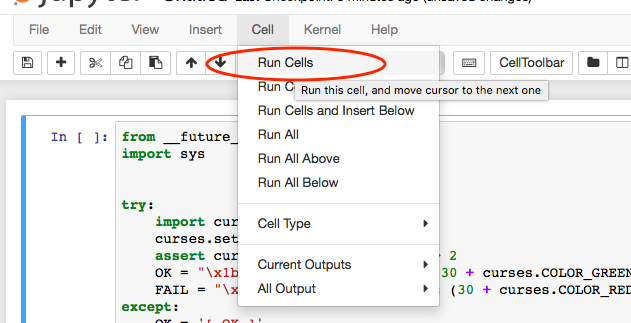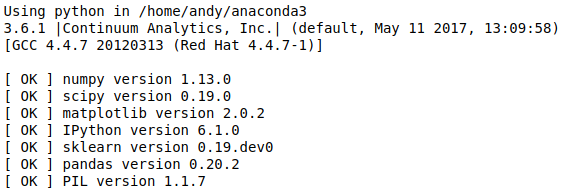amueller / Scipy 2018 Sklearn
Labels
Projects that are alternatives of or similar to Scipy 2018 Sklearn
SciPy 2018 Scikit-learn Tutorial
Instructors
- Guillaume Lemaitre @glemaitre - Inria, Université Paris-Saclay
- Andreas Mueller @amuellerml - Columbia University; Book: Introduction to Machine Learning with Python
This repository will contain the teaching material and other info associated with our scikit-learn tutorial at SciPy 2018 held July 9-15 in Austin, Texas.
Parts 1 to 12 make up the morning session, while parts 13 to 23 will be presented in the afternoon (approximately)
Schedule:
The 2-part tutorial will be held on Tuesday, July 10, 2018.
Obtaining the Tutorial Material
If you have a GitHub account, it is probably most convenient if you clone or fork the GitHub repository. You can clone the repository by running:
git clone https://github.com/amueller/scipy-2018-sklearn.git
If you are not familiar with git or don’t have an GitHub account, you can download the repository as a .zip file by heading over to the GitHub repository (https://github.com/amueller/scipy-2018-sklearn) in your browser and click the green “Download” button in the upper right.
Please note that we may add and improve the material until shortly before the tutorial session, and we recommend you to update your copy of the materials one day before the tutorials. If you have an GitHub account and cloned the repository via GitHub, you can sync your existing local repository with:
git pull origin master
If you don’t have a GitHub account, you may have to re-download the .zip archive from GitHub.
Installation Notes
This tutorial will require recent installations of
The last one is important and you should be able to type:
jupyter notebook
in your terminal window and see the notebook panel load in your web browser. Try opening and running a notebook from the material to see check that it works. Alternatively you can use Jupyter lab.
For users who do not yet have the required packages installed, a relatively painless way to install all the requirements is to use a Python distribution such as Anaconda, which includes the most relevant Python packages for science, math, engineering, and data analysis; Anaconda can be downloaded and installed for free including commercial use and redistribution. The code examples in this tutorial should be compatible to Python 2.7, Python 3.4-3.6.
After obtaining the material, we strongly recommend you to open and execute
the Jupyter Notebook jupter notebook check_env.ipynb that is located at the
top level of this repository. Inside the repository, you can open the notebook
by executing
jupyter notebook check_env.ipynb
inside this repository. Inside the Notebook, you can run the code cell by clicking on the "Run Cells" button as illustrated in the figure below:
Finally, if your environment satisfies the requirements for the tutorials, the executed code cell will produce an output message as shown below:
Although not required, we also recommend you to update the scikit-learn the latest release version to ensure best compatibility with the teaching material. Please upgrade already installed packages by executing
pip install --no-deps --upgrade [package-name]- or
conda update [package-name]
Depending on how you installed scikit-learn.
Data Downloads
The data for this tutorial is not included in the repository. We will be using several data sets during the tutorial: most are built-in to scikit-learn, which includes code that automatically downloads and caches these data.
Because the wireless network at conferences can often be spotty, it would be a good idea to download these data sets before arriving at the conference. Please run
python fetch_data.py
to download all necessary data beforehand.
The download size of the data files are approx. 280 MB, and after fetch_data.py
extracted the data on your disk, the ./notebook/dataset folder will take 480 MB
of your local hard drive.
Outline
Morning Session
- 01 Introduction to machine learning with sample applications, Supervised and Unsupervised learning [view]
- 02 Scientific Computing Tools for Python: NumPy, SciPy, and matplotlib [view]
- 03 Data formats, preparation, and representation [view]
- 04 Supervised learning: Training and test data [view]
- 05 Supervised learning: Estimators for classification [view]
- 06 Supervised learning: Estimators for regression analysis [view]
- 07 Unsupervised learning: Unsupervised Transformers [view]
- 08 Unsupervised learning: Clustering [view]
- 09 The scikit-learn estimator interface [view]
- 10 Preparing a real-world dataset (titanic) [view]
- 11 Working with text data via the bag-of-words model [view]
- 12 Application: IMDb Movie Review Sentiment Analysis [view]
Afternoon Session
- 13 Cross-Validation [view]
- 14 Model complexity and grid search for adjusting hyperparameters [view]
- 15 Scikit-learn Pipelines [view]
- 16 Supervised learning: Performance metrics for classification [view]
- 17 Supervised learning: Linear Models [view]
- 18 Supervised learning: Decision trees and random forests, and ensemble methods [view]
- 19 Supervised learning: feature selection [view]
- 20 Unsupervised learning: Hierarchical and density-based clustering algorithms [view]
- 21 Unsupervised learning: Non-linear dimensionality reduction [view]
- 22 Unsupervised learning: Anomaly Detection [view]
- 23 Supervised learning: Out-of-core learning [view]



